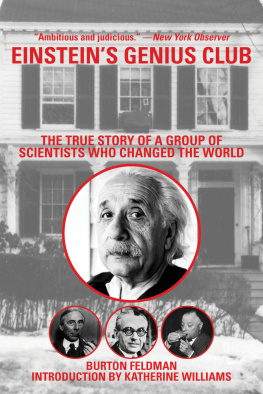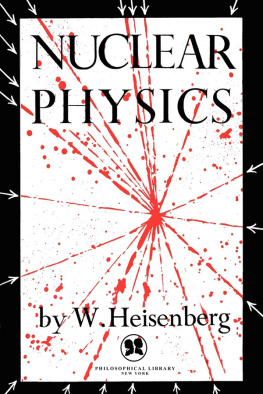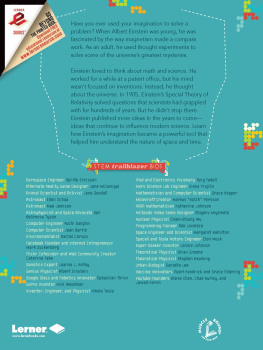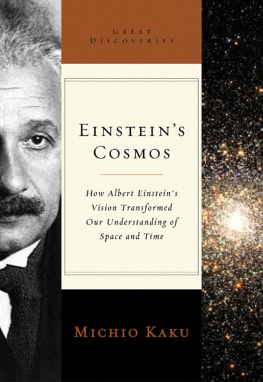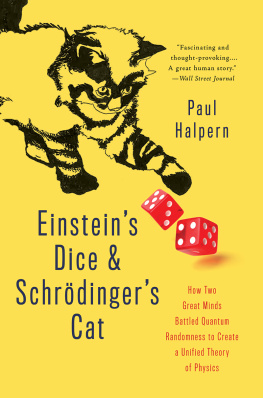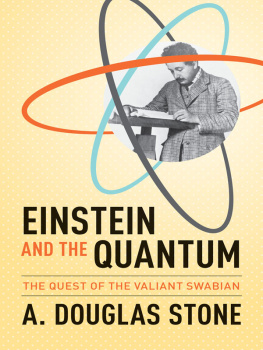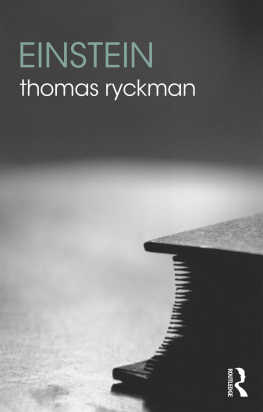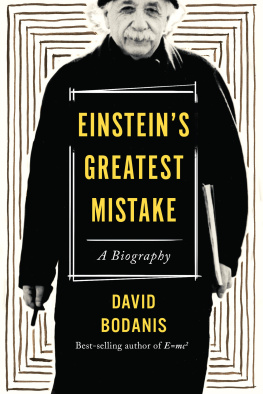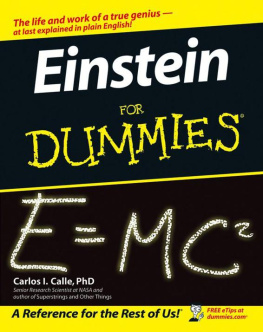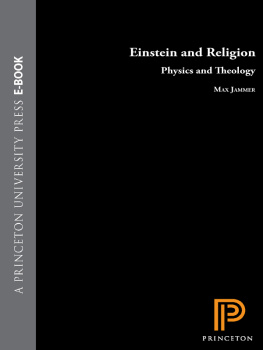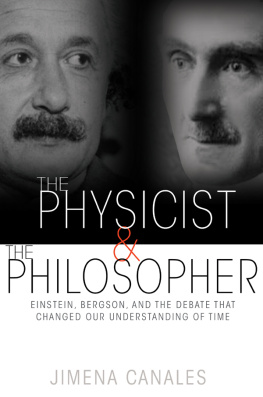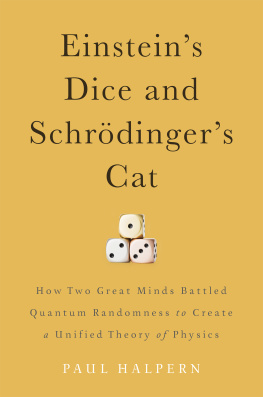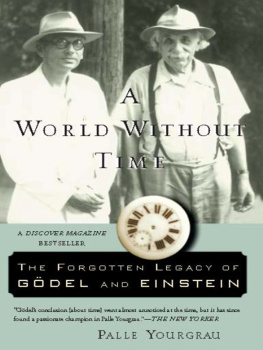EINSTEIN'S GENIUS CLUB
ALSO BY BURTON FELDMAN
The Nobel Prize:
A History of Genius, Controversy, and Prestige
EINSTEIN'S GENIUS CLUB
THE TRUE STORY OF A GROUP OF SCIENTISTS
WHO CHANGED THE WORLD
BURTON FELDMAN
INTRODUCTION BY KATHERINE WILLIAMS

ARCADE PUBLISHING NEW YORK
Copyright 2007, 2011 by Burton Feldman and Katherine Williams
All Rights Reserved. No part of this book may be reproduced in any manner without the express written consent of the publisher, except in the case of brief excerpts in critical reviews or articles. All inquiries should be addressed to Arcade Publishing, 307 West 36th Street, 11th Floor, New York, NY 10018.
Arcade Publishing books may be purchased in bulk at special discounts for sales promotion, corporate gifts, fund-raising, or educational purposes. Special editions can also be created to specifications. For details, contact the Special Sales Department, Arcade Publishing, 307 West 36th Street, 11th Floor, New York, NY 10018 or info@skyhorsepublishing.com .
Arcade Publishing is a registered trademark of Skyhorse Publishing, Inc., a Delaware corporation.
Visit our website at www.arcadepub.com .
10 9 8 7 6 5 4 3 2 1
Library of Congress Cataloging-in-Publication Data is available on file.
ISBN: 978-1-61145-342-3
Printed in the United States of America
To Peggy Feldman

CONTENTS
PART 4: BEYOND PATHOS: OPPENHEIMER,
HEISENBERG, AND THE WAR

INTRODUCTION
GIVEN THE DAZZLING HISTORY of twentieth-century scientific discovery, the story of Albert Einstein, Bertrand Russell, Kurt Gdel, and Wolfgang Pauli in conversation might seem trivial. Nothing really emerged from their meetings, as far as we can tellneither momentous discovery nor earth-shattering weaponry.
Yet their confluence in the small town of Princeton, New Jersey, during the winter of 194344 is fascinating to ponder. They were giants divided by a generation. Einstein was schooled in classical physics; Russell began his career at the very dawn of mathematical logic. By the 1920s, when Pauli and Gdel came of age, certainties had dissolved. For Pauli, especially, the new quantum physics opened up endless possibilities for insight and production.
In this generational battle, Einstein fought desperately against the quantum mechanics so ably theorized by Pauli and his quantum brethren. Unable to refute the new physics, Einstein retreated into what now seems a doomed search for a unified theory. To his contemporaries, it seemed daft, even obstructionist. His failed search illustrates the pathos of science. For scientists, as for athletes, age does not correlate with creativity. The poet may begin a long career with an apprenticeship of pastoral poetry, progressing finally to the noble epic, a trajectory known as Virgil's wheel. But science and mathematics are notoriously the provinces of youth.
As Einstein fought his battle in the world of physics, history was busy transforming how physics worked. World War II turned theoretical physics into a race for the ultimate weapon. Robert Oppenheimer, once a student of Pauli, headed the project in America. Werner Heisenberg, Pauli's friend and partner in the founding of quantum mechanics, was integral to Germany's effort. Inevitably, the bomb conferred on physics both prestige and peril. It took a soldier to coin the phrase military-industrial complex. Well before Eisenhower's words of warning, physicists understood their plight. The war, said the scientist and novelist C. P. Snow in a speech on morality and science, turned physicists into soldiers-not-in-uniform.
The pretext for this book is the gathering of four great minds in an academic backwater during a war that would change science forever. I used to go to [Einstein's] house once a week to discuss with him and Gdel and Pauli, wrote Russell in his Autobiography. That these meetings occurred is generally accepted by the biographers of Einstein, Russell, and Pauli. However, as with all things human, there is disagreement, and to ignore contrary evidence would be unseemly, not to mention unscholarly. Thus, against Russell's recollection of those meetings at 112 Mercer Street, we must cast some doubtthat is, uncertainty of a mundane, rather than quantum, sort. Russell himself, speaking on the BBC in 1965, reported that in Princeton, Einstein arranged to have a little meeting at his house once a week at which there would be some one or two eminent physicists and myself. No mention was made of Gdel. Only in his Autobiography does Russell assert that he, Einstein, Pauli, and Gdel met regularly.
In 1971, Kurt Gdel learned of Russell's claim and drafted (but never sent) a rebuttal of sorts to a friend: [t]he passage gives the wrong impression that I had many discussions with Russell, which was by no means the case (I remember only one). More pointed was Gdel's acerbic retort to Russell's assertion in the same passage that Gdel turned out to be an unadulterated Platonist. Gdel responded, [My] platonism is no more unadulterated than Russell's own in 1921. As we shall see, Russell and Gdel enjoyed a tangled relationshipone that might have encouraged exaggeration about the question of their meeting from either man. It is possible, even likely, that Gdel turned up at Einstein's rather less than Russell's remark suggests, and equally possible that he showed up more than once.
Who was in attendance and when will forever be a matter of conjecture, as must our thoughts on what might have been said, beyond Russell's few (easily assailable) memories. More fascinating is the contextcultural, theoretical, biographical, and historicalof those meetings. The crosscurrents that made up this context are the subject of this book.
Finally, as must be obvious, the perspective of this book is not that of a scientist. Some might argue that the history of science is better left to scientists. For better or for worse, however, nonscientists are enthralled by that richly creative, densely coded worldbeyond our grasp as laypersons, yet so enveloping of our lives.
To elucidate major characters and relevant concepts, we provide below brief biographical sketches and a glossary of terms. Terminology in boldface is cross-referenced in the Glossary.
ALBERT EINSTEIN (18791955)
With the publication of his theory of general relativity, Einstein, already well known among physicists, became world famous. No more ubiquitous a face has ever represented science in the popular imagination. Almost instantly, Einstein turned his fame into a platform for political and humanitarian causes: internationalism, support for Israel, antifascism, civil rights, socialism. At the end of his life, with Russell, he made a final plea for world peace.
Best known among Einstein's works are the two relativity theories: the special theory of relativity (1905), which introduced the notion of spacetime, and the general theory of relativity (1916), which explained gravitation. In his miracle year of 1905, Einstein wrote a total of four papers, including that proposing special relativity. Ironically, it was not for either theory of relativity, but for the first of his 1905 papers that Einstein won the 1922 Nobel Prize in Physics. That paper, on the photoelectric effect, was an inaugural step in the development of quantum mechanics
Next page
